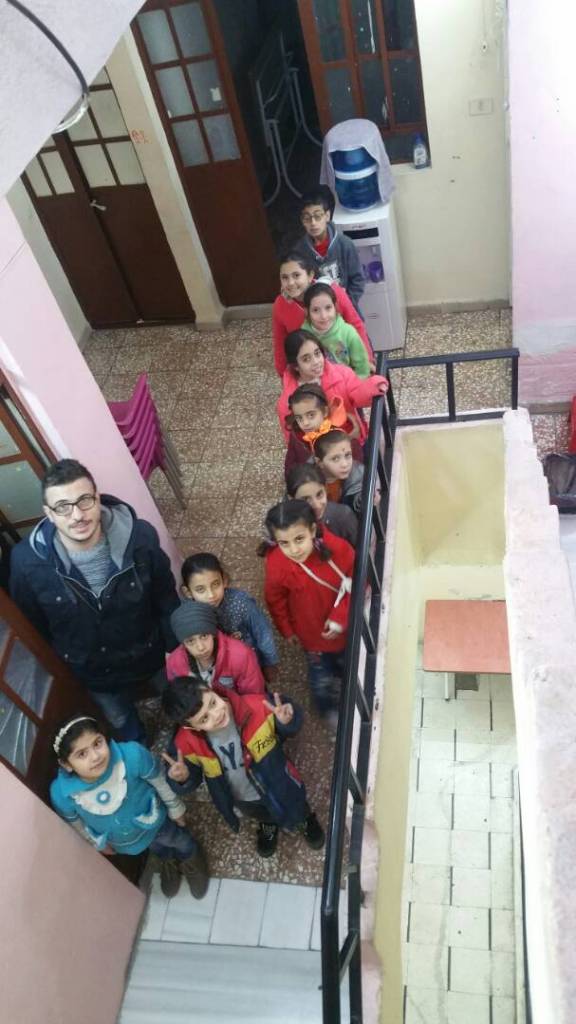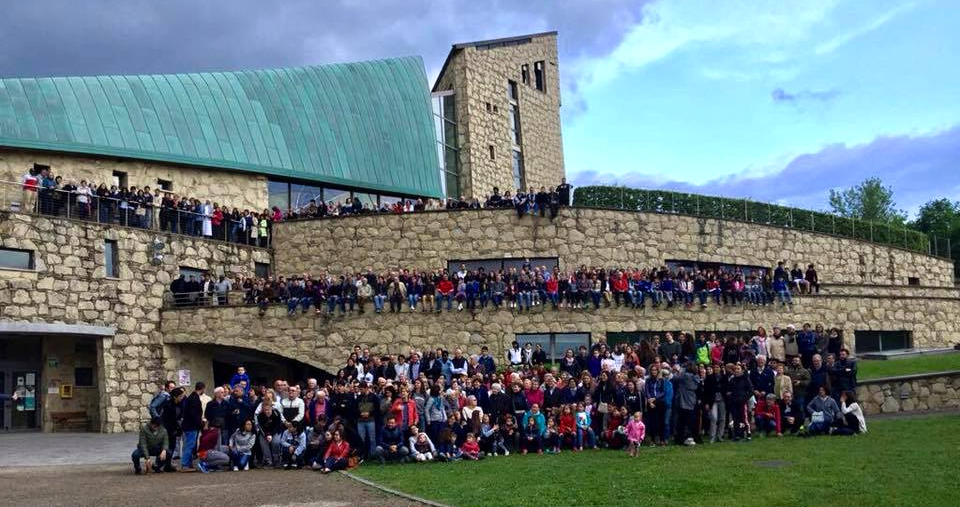
Pope Francis in Loppiano
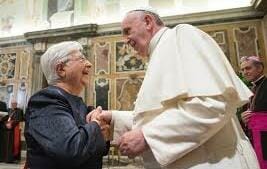 In Loppiano all is ready to welcome the Holy Father. Around 6,000 people from all over Italy are arriving, but thousands will be linked up in streaming in the five continents. We asked Maria Voce, Focolare President, how this encounter will take place. “We want to present to the Pope.” she explained, “this tiny town, the first among other 24 diffused worldwide, which wants to offer a model of coexistence founded on the evangelical principles of solidarity and fraternity, certainly unique, but able to be spread and repeated elsewhere. In Loppiano, the Pope will not only meet the 750 inhabitants, ” Maria Voce continued, “but also a representative group of the Focolare’s global family. We shall ask him some questions on themes that we hold dear: the challenge of fidelity to the charismatic idea of Chiara Lubich in contrast with the changed conditions of today; the education of the young people in a culture of fraternity; and Loppiano’s model of coexistence as a contribution to the current announcement of the Christian message and the overcoming of barriers, nationalism and prejudices.” The Focolare Movement is a variegated constellation that places at the core of its actions and dialogue a lifestyle that concurs to construct unity and peace in the world. It counts over 2 million members belonging to many Christian Churches, but also of different religious beliefs and lay inspirations. It undertakes around 1,000 social actions underway in various countries, and around 800 enterprises worldwide that work according to the principles of the Economy of Communion. The Sophia University, based precisely in Loppiano is now in its tenth year of life.
In Loppiano all is ready to welcome the Holy Father. Around 6,000 people from all over Italy are arriving, but thousands will be linked up in streaming in the five continents. We asked Maria Voce, Focolare President, how this encounter will take place. “We want to present to the Pope.” she explained, “this tiny town, the first among other 24 diffused worldwide, which wants to offer a model of coexistence founded on the evangelical principles of solidarity and fraternity, certainly unique, but able to be spread and repeated elsewhere. In Loppiano, the Pope will not only meet the 750 inhabitants, ” Maria Voce continued, “but also a representative group of the Focolare’s global family. We shall ask him some questions on themes that we hold dear: the challenge of fidelity to the charismatic idea of Chiara Lubich in contrast with the changed conditions of today; the education of the young people in a culture of fraternity; and Loppiano’s model of coexistence as a contribution to the current announcement of the Christian message and the overcoming of barriers, nationalism and prejudices.” The Focolare Movement is a variegated constellation that places at the core of its actions and dialogue a lifestyle that concurs to construct unity and peace in the world. It counts over 2 million members belonging to many Christian Churches, but also of different religious beliefs and lay inspirations. It undertakes around 1,000 social actions underway in various countries, and around 800 enterprises worldwide that work according to the principles of the Economy of Communion. The Sophia University, based precisely in Loppiano is now in its tenth year of life.  Upon his arrival in the town, the Holy Father will go directly to the Church of Maria Theotókos, where he shall stop briefly to pray. He will also pray before the painting of the Madonna with Child, the work of a painter belonging to the Hindu religion and symbol of the dialogue which is one of the many pillars of coexistence in Loppiano. Then in the churchyard, Maria Voce will greet the Pope on behalf of the Focolare Movement. A moment of dialogue will follow in which some citizens of Loppiano will ask him some questions. This session will be interrupted with music pieces of artists from various countries and religious environments. Lastly, around 30 citizens will personally greet the Pope who will leave to return to the Vatican, after the benediction.
Upon his arrival in the town, the Holy Father will go directly to the Church of Maria Theotókos, where he shall stop briefly to pray. He will also pray before the painting of the Madonna with Child, the work of a painter belonging to the Hindu religion and symbol of the dialogue which is one of the many pillars of coexistence in Loppiano. Then in the churchyard, Maria Voce will greet the Pope on behalf of the Focolare Movement. A moment of dialogue will follow in which some citizens of Loppiano will ask him some questions. This session will be interrupted with music pieces of artists from various countries and religious environments. Lastly, around 30 citizens will personally greet the Pope who will leave to return to the Vatican, after the benediction.
Live streaming 10 May 2018, 10.00am till 12.00 noon (CEST): Vatican Media Live http://live.focolare.org

Simon the Shark

Simon Barlaam
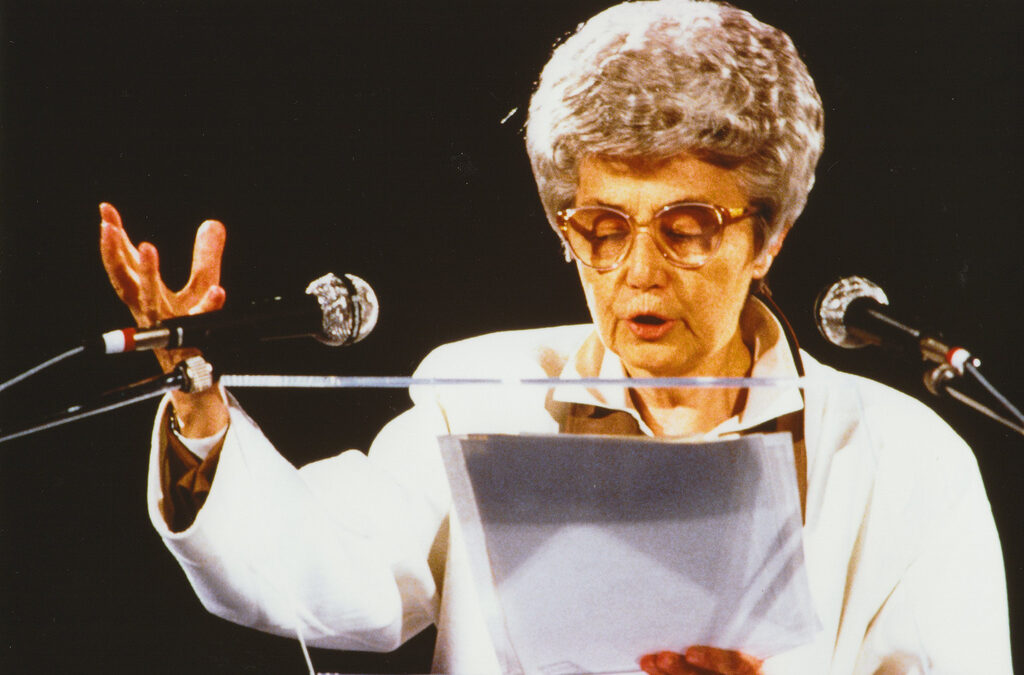
The roads to a united world
 The unity of the world. My dear young people, is our attention so distracted by the events we are immersed in day after day, that we do not see how our age is characterized by tension, by wars, by guerrilla warfare, even by the threat of nuclear destruction, by disunity of all kinds, by acts of terrorism, kidnappings, by all kinds of evil, all generated by the lack of love and mutual understanding among people? Do we not see that to speak of unity today is almost like speaking of a utopia? … But, thank God, these are not the only characteristics of our times. There is something more we have to consider. […] The world is undoubtedly moving towards unity. Unity is its destiny or, better still, it is God’s plan for the world. […] We will answer your questions not only with words but, after this Genfest, with life. We will walk with determination along the various roads that offer solutions to the divided world by uniting it. The various roads, to give a few examples, are the roads to unity among generations, among ethnic groups and nations, between east and west, between north and south; the road to unity among Christians of various denominations, among the faithful of different religions; the road to unity between rich and poor through a communion of goods; between nations at war in order to reach peace; the road to unity also between humankind and nature; the road to unity with those who are indifferent, with the lonely, with those who suffer in any way at all; the road to development, to progress; the road to unity among various spiritual movements, among lay associations; among persons of different ideologies and cultures and so on. As you can see, some of these are roads that young people have already taken because they feel naturally inclined to do so. They want to walk along these various ways, by first situating themselves squarely in the Way par excellence. […] the way that is Christ. He said of himself, “I am the Way”.[1] What must we do to be grafted onto this Way which will enable us to bear fruit as we go along the other ways? We must be Jesus, another Jesus. […] By living the word, all the Christian life sowed in us at baptism will fully blossom. Young people of all Churches and Christian communities will be able to join us in living this word. The word in many of its expressions (this has been our experience) is accepted also by young people of other religions and by those in good faith who consider themselves atheists. The word will shape all of you into one block, making you strong and unbreakable. […] If you are faithful, if you spread throughout the world as many other Jesus, so to say, then the program, “That all may be one”, will not be a dream; it will be a reality. And your contribution will bring us closer and closer to this reality. A springtime will blossom in the world. We will see miracles. Christ’s words will be fulfilled in you, “Whoever believes in me will do the works I do and greater works than these”.[2] Extracts from Chiara Lubich’s talk at the Genfest in Rome 30th March 1985 [1]. John 14:6. [2]. John 14:12.
The unity of the world. My dear young people, is our attention so distracted by the events we are immersed in day after day, that we do not see how our age is characterized by tension, by wars, by guerrilla warfare, even by the threat of nuclear destruction, by disunity of all kinds, by acts of terrorism, kidnappings, by all kinds of evil, all generated by the lack of love and mutual understanding among people? Do we not see that to speak of unity today is almost like speaking of a utopia? … But, thank God, these are not the only characteristics of our times. There is something more we have to consider. […] The world is undoubtedly moving towards unity. Unity is its destiny or, better still, it is God’s plan for the world. […] We will answer your questions not only with words but, after this Genfest, with life. We will walk with determination along the various roads that offer solutions to the divided world by uniting it. The various roads, to give a few examples, are the roads to unity among generations, among ethnic groups and nations, between east and west, between north and south; the road to unity among Christians of various denominations, among the faithful of different religions; the road to unity between rich and poor through a communion of goods; between nations at war in order to reach peace; the road to unity also between humankind and nature; the road to unity with those who are indifferent, with the lonely, with those who suffer in any way at all; the road to development, to progress; the road to unity among various spiritual movements, among lay associations; among persons of different ideologies and cultures and so on. As you can see, some of these are roads that young people have already taken because they feel naturally inclined to do so. They want to walk along these various ways, by first situating themselves squarely in the Way par excellence. […] the way that is Christ. He said of himself, “I am the Way”.[1] What must we do to be grafted onto this Way which will enable us to bear fruit as we go along the other ways? We must be Jesus, another Jesus. […] By living the word, all the Christian life sowed in us at baptism will fully blossom. Young people of all Churches and Christian communities will be able to join us in living this word. The word in many of its expressions (this has been our experience) is accepted also by young people of other religions and by those in good faith who consider themselves atheists. The word will shape all of you into one block, making you strong and unbreakable. […] If you are faithful, if you spread throughout the world as many other Jesus, so to say, then the program, “That all may be one”, will not be a dream; it will be a reality. And your contribution will bring us closer and closer to this reality. A springtime will blossom in the world. We will see miracles. Christ’s words will be fulfilled in you, “Whoever believes in me will do the works I do and greater works than these”.[2] Extracts from Chiara Lubich’s talk at the Genfest in Rome 30th March 1985 [1]. John 14:6. [2]. John 14:12.
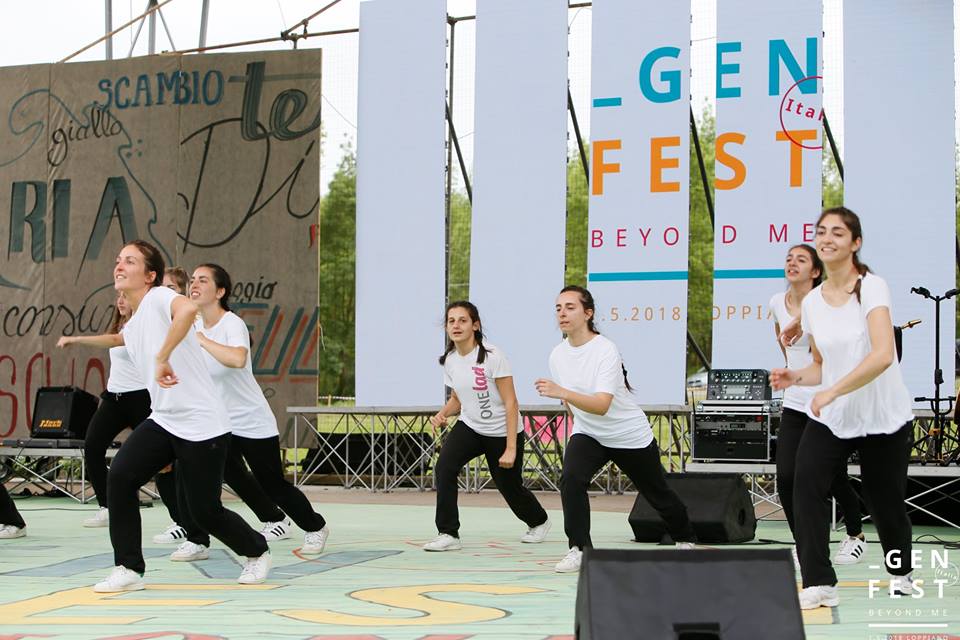
Beyond One’s Limits
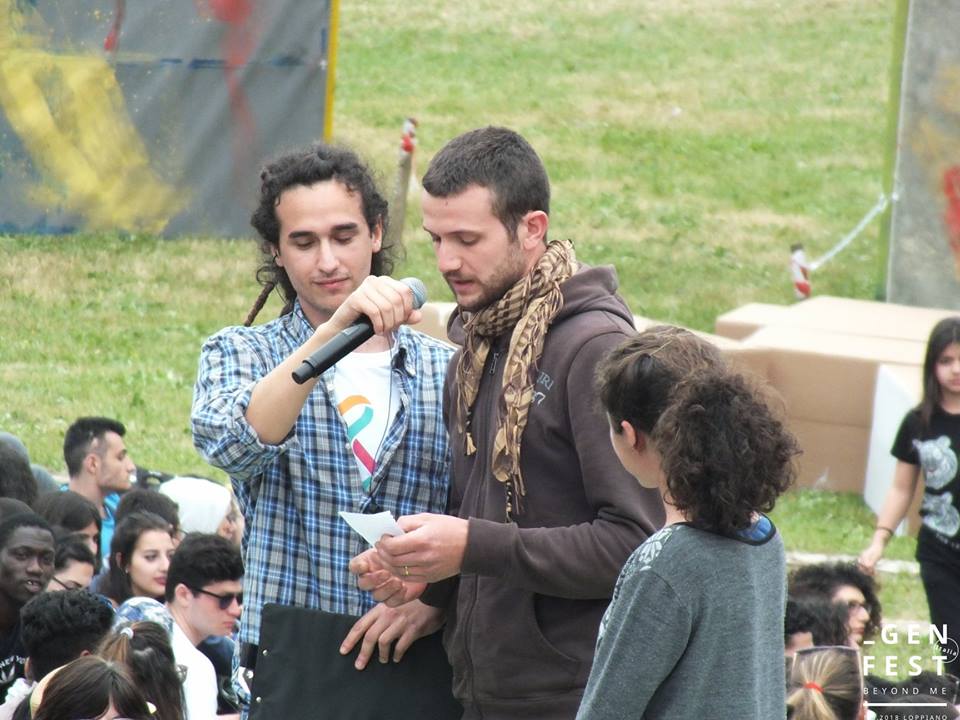 “My family is Christian and refuses to kill or carry weapons,” says George, a young Syrian from Homs. We’re in Loppiano, the Focolare international town near Florence, Italy where hundreds of young people from all over country have gathered for a meeting that include testimonies, sharing and much festivity. This year the event was held in anticipation of the much larger international Genfest, which will be heldnext month in Manila, Philippines (http://y4uw.org/it/events/genfest-2018/). The May 1st gathering was the Italian edition where 3700 young people took part in a one-day celebration of fraternity with reporting on projects, social action, personal experiences in which people came face to face with the personal dramas and pain of humanity. As in the case of George and Michael who left everyone breathless with their description of what they have been experiencing for years years in Syria. “We’ve seen many people die,” says George. “For a period of time I even had to carry a knife to protect myself, to defend myself in case of danger. Years of hatred, death and loss of dignity had emptied my heart and I began to think that love didn’t exist. Only the Mariapolis was able to remove this thought from my mind (several days spent living in the light of the Gospel, an annual gathering of the Focolare). After that Mariapolis I never carried a knife again and decided to start responding to hatred with love.” The final appeal to the young people was strongly embraced: “Don’t complain about your life. It’s beautiful, you just don’t realize it.”
“My family is Christian and refuses to kill or carry weapons,” says George, a young Syrian from Homs. We’re in Loppiano, the Focolare international town near Florence, Italy where hundreds of young people from all over country have gathered for a meeting that include testimonies, sharing and much festivity. This year the event was held in anticipation of the much larger international Genfest, which will be heldnext month in Manila, Philippines (http://y4uw.org/it/events/genfest-2018/). The May 1st gathering was the Italian edition where 3700 young people took part in a one-day celebration of fraternity with reporting on projects, social action, personal experiences in which people came face to face with the personal dramas and pain of humanity. As in the case of George and Michael who left everyone breathless with their description of what they have been experiencing for years years in Syria. “We’ve seen many people die,” says George. “For a period of time I even had to carry a knife to protect myself, to defend myself in case of danger. Years of hatred, death and loss of dignity had emptied my heart and I began to think that love didn’t exist. Only the Mariapolis was able to remove this thought from my mind (several days spent living in the light of the Gospel, an annual gathering of the Focolare). After that Mariapolis I never carried a knife again and decided to start responding to hatred with love.” The final appeal to the young people was strongly embraced: “Don’t complain about your life. It’s beautiful, you just don’t realize it.” 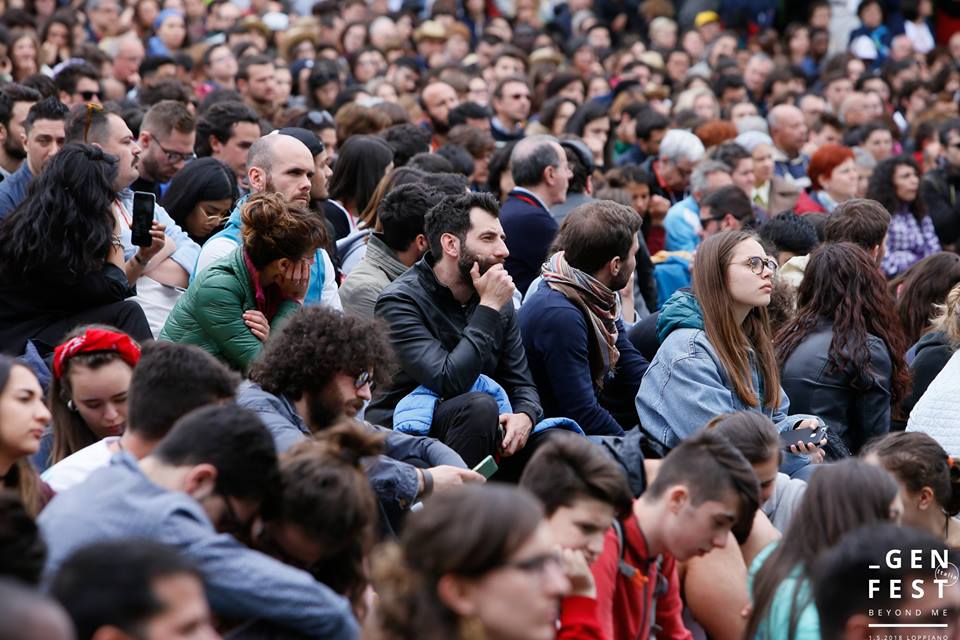 The conducting thread of the event, which was entitled “Beyond Me”, was the desire to go beyond one’s limits and boundaries in order to bring about a personal and, especially, a social change. Roberto Spuri and Elena Sofia Ferri bore witness to this as they told about the experience of the earthquake in Central Italy; Alessio Lanaloni and Maria Chiara Cefaloni, with their efforts for a disarmed economy; Alessandra Leanza, with the experience of volunteering with Rom children in Sardinia. And Marco Voleri, the internationally renowned tenor and founder of “Sintomi di Felicita” which promotes public awareness of multiple sclerosis; Simone Barlaam, para-olympic swimming champion at the Mexican world games. Michele Tranzuilli, author of the book Una buona idea and promoter of the bridge with Africa YouAid; Sara Fabris, painter.
The conducting thread of the event, which was entitled “Beyond Me”, was the desire to go beyond one’s limits and boundaries in order to bring about a personal and, especially, a social change. Roberto Spuri and Elena Sofia Ferri bore witness to this as they told about the experience of the earthquake in Central Italy; Alessio Lanaloni and Maria Chiara Cefaloni, with their efforts for a disarmed economy; Alessandra Leanza, with the experience of volunteering with Rom children in Sardinia. And Marco Voleri, the internationally renowned tenor and founder of “Sintomi di Felicita” which promotes public awareness of multiple sclerosis; Simone Barlaam, para-olympic swimming champion at the Mexican world games. Michele Tranzuilli, author of the book Una buona idea and promoter of the bridge with Africa YouAid; Sara Fabris, painter.  Projects. All the stories that were told at Genfest-Italy were connected to concrete experiences: an association, a social project, which anyone could “adopt” in the coming year. This was the call to action that was launched at the end of the event with an invitation to each young person to choose a project and replicate it everywhere else. To facilitate their work, the associations that are actively engaged in the cities of Italy posted links on the United world project website, according to region. Genfest Italy concluded with a city that “flying” city, a city that was depicted in the final choreography that was based on a meditation by Chiara Lubich: “One City Is Not Enough:” “For God, one city is too little. He made the stars, guided the destiny of Time. With God you can see farther, to everyone’s country, to the whole globe. At the end of life let us not have to regret that we loved too little.” Loppiano is getting ready to welcome Pope Francis on May 10th, and it wasn’t by chance that a group of young people from Nomadelfia was at Genfest Italy bringing the greetings of their community, which will also be visited by Pope Francis on the same day. As we prepare to welcome him our friendship is growing and intensifying. Source: www.cittanuova.it Flickr photo gallery
Projects. All the stories that were told at Genfest-Italy were connected to concrete experiences: an association, a social project, which anyone could “adopt” in the coming year. This was the call to action that was launched at the end of the event with an invitation to each young person to choose a project and replicate it everywhere else. To facilitate their work, the associations that are actively engaged in the cities of Italy posted links on the United world project website, according to region. Genfest Italy concluded with a city that “flying” city, a city that was depicted in the final choreography that was based on a meditation by Chiara Lubich: “One City Is Not Enough:” “For God, one city is too little. He made the stars, guided the destiny of Time. With God you can see farther, to everyone’s country, to the whole globe. At the end of life let us not have to regret that we loved too little.” Loppiano is getting ready to welcome Pope Francis on May 10th, and it wasn’t by chance that a group of young people from Nomadelfia was at Genfest Italy bringing the greetings of their community, which will also be visited by Pope Francis on the same day. As we prepare to welcome him our friendship is growing and intensifying. Source: www.cittanuova.it Flickr photo gallery
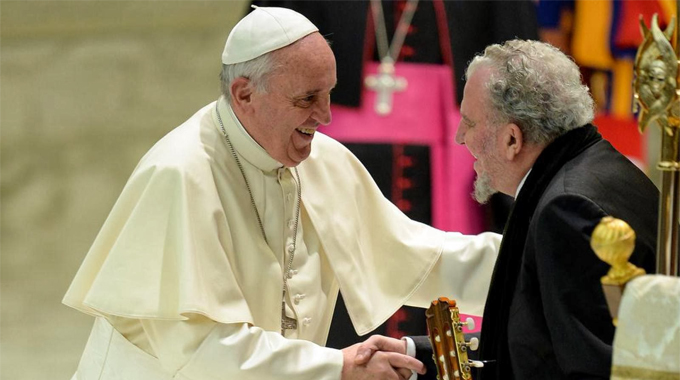
Pope Francis to meet members of the Neocathecumenal Way
 On May 5, at Tor Vergata (Rome), Pope Francis will meet the members of the Neocatechumenal Way gathered for their international meeting. The occasion will mark 50 years of the presence of the Way in Rome. 150 thousand participants from 134 nations are expected to attend. The Pope will send out 36 new “missio ad gentes” groups that will take the Gospel into secularized areas or in regions with Christian minorities. Francis will also bless the 20 communities, that are part of parishes of Rome, which have already concluded this form of Christian initiation. The meeting, which will end with the singing of the “Te Deum”, will be led by the international core group of the Neocatechumenal Way, composed of Kiko Argüello, Fr Mario Pezzi and Ascensión Romero.
On May 5, at Tor Vergata (Rome), Pope Francis will meet the members of the Neocatechumenal Way gathered for their international meeting. The occasion will mark 50 years of the presence of the Way in Rome. 150 thousand participants from 134 nations are expected to attend. The Pope will send out 36 new “missio ad gentes” groups that will take the Gospel into secularized areas or in regions with Christian minorities. Francis will also bless the 20 communities, that are part of parishes of Rome, which have already concluded this form of Christian initiation. The meeting, which will end with the singing of the “Te Deum”, will be led by the international core group of the Neocatechumenal Way, composed of Kiko Argüello, Fr Mario Pezzi and Ascensión Romero.
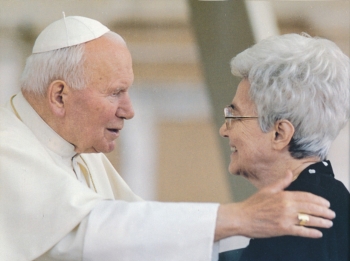
Chiara Lubich: A charism which generates new life
 “The path of a prophecy”. On the tenth anniversary of the death of Chiara Lubich, founder of the Focolare Movement, a conference was held on 3rd May promoted by the Italian Embassy to the Holy See in conjunction with the Sovereign Military Order of Malta, and in collaboration with the Focolare. It was an opportunity for a reflection on the economy in the light of the charism of unity. Mgr. Giovanni Angelo Becciu, the Vatican Deputy Secretary of State, Maria Voce, president of the Focolare Movement, Luigino Bruni, professor of Economics at the LUMSA University of Rome, Leonardo Becchetti, professor of Economics at the University took part of Rome Tor Vergata, and Simona Rizzi, president of the Tassano Servizi Territoriali Consortium. In her speech, Maria Voce said that the Focolare Movement “would not achieve its vocation if it did not implement the first page of the Christian social doctrine, the prayer of the Magnificat in which among other things it says: “He filled the hungry with good things and sent back the rich empty-handed“. The Economy of Communion, born from an inspiration of Chiara Lubich, has given life to a social action model, in dialogue with contemporary culture, particularly in the field of economy, both locally and internationally.
“The path of a prophecy”. On the tenth anniversary of the death of Chiara Lubich, founder of the Focolare Movement, a conference was held on 3rd May promoted by the Italian Embassy to the Holy See in conjunction with the Sovereign Military Order of Malta, and in collaboration with the Focolare. It was an opportunity for a reflection on the economy in the light of the charism of unity. Mgr. Giovanni Angelo Becciu, the Vatican Deputy Secretary of State, Maria Voce, president of the Focolare Movement, Luigino Bruni, professor of Economics at the LUMSA University of Rome, Leonardo Becchetti, professor of Economics at the University took part of Rome Tor Vergata, and Simona Rizzi, president of the Tassano Servizi Territoriali Consortium. In her speech, Maria Voce said that the Focolare Movement “would not achieve its vocation if it did not implement the first page of the Christian social doctrine, the prayer of the Magnificat in which among other things it says: “He filled the hungry with good things and sent back the rich empty-handed“. The Economy of Communion, born from an inspiration of Chiara Lubich, has given life to a social action model, in dialogue with contemporary culture, particularly in the field of economy, both locally and internationally.
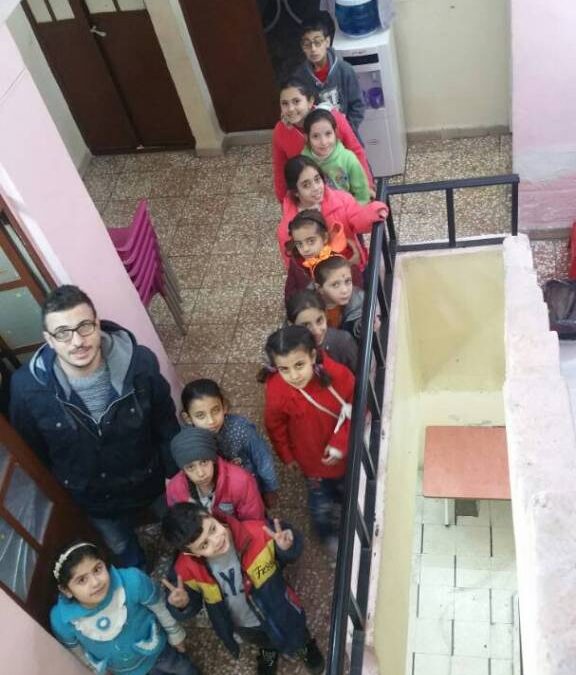
The “Children’s Home” in Damascus
“A bomb exploded a few meters away from my house. I should have been in the place of the explosion to reach my work place. But that day I was ten minutes late. It was a sign of fate.” Her voice was clear, calm, and in perfect French, showing a serenity that contrasted with the sound of bombs and airplanes that alternate in the daily life of the capital, Damascus. Zéna was born in Lebanon 35 years ago, and arrived in Syria last July. A member of the Focolare Movement, she had decided to join the country at war, after a long reflection. In her birthplace, she had experienced the war and bombs. “I kept it all inside me. I was scared. But one day I started to see things in a positive light. I entrusted all to God and came to Damascus with the Focolare.” In the first 6 months she lived under the air raids. “Up to December the raids were daily, but we still managed to continue our lives,” she said, “until that day in January when a bomb fell just a few meters from the house. In Syria, despite the courage of the inhabitants, fear and danger are always close at hand.” Zéna works for the “Maison des enfants” run by the Movement in cooperation with others, in the poor district of Douela in Damascus. The centre has four classes for 90 children aged 6 to 10. Eight teachers are all young Syrian scholars. “We called it the ’Children’s Home’ because we want to be their family. We receive many requests which we are unable to accept. We gather the poorer children, many of whom have lost both parents or who suffered violence. They need to be surrounded by adults who love them.” In February, the “Maison” had to close for several weeks due to an attack. “It was a terrible moment when the children were asked if they were afraid of the bombings. Most of them answered evasively, rejecting the reality. There is a lot of suffering related to the consequences of the war.” The center reopened at the start of April, to the great joy of the students. “They are really happy to come, and sad when they have to leave.” Life has resumed in Syria. Now the country is almost entirely under the control of the Syrian government. “During the weekends, the bars are open up to one or two in the morning. The people are stressed, they need an outlet.” Zena lives at the “East Gate– Bab Sharqi” of Damascus, in the old city. Few bombs have fallen in 7 years in the neighbourhood, although the signs of long years of conflict are evident. “Today there is little work. Many young people have gone to Europe or Lebanon to avoid having to do military service, or to find a job. In Syria, there is a ratio of 10 women to 1 man.” The Focolare Movement serenely carries out its mission. “Here the Christians are protected by the government. We are well respected. After 7 years of war, the eastern churches were able to hold the Easter processions in the streets. At the end of the conflict – she continued – precisely the Syrian people will be the ones to rebuild the country. The worksite is enormous. Damascus is not destroyed but the damage is immense in the Aleppo and Homs regions. The Syrian lira has lost most of its value and many wealthy families have become poor. The elite have disappeared, and there are only people in great need. How do the young graduates find a job? Despite this, many have remained. They believe in the restoration of their country.” Before the physical reconstruction and economic recovery, Syria will have to uproot the armed conflicts in its territory. Zéna is convinced that the end of the war is near. “If there are no external interventions, I’m sure that the war on Syrian soil will be over before 2018 ends. We have to restore work and dignity to the people. I really hope that little by little, the enterprises will return, and so will the tourists. We have to give a new motivation to the Syrians, starting from the children who are the pillars of future society, and “Her” children, precisely. Today it’s Zena’s turn to prepare lunch. Every day I come to work with incredible joy.” Source: imprimaturweb.frLiving the Gospel: “As free children of God”
Chocolate Factory During the summer I travelled with a friend to Germany, to work in a well-known chocolate factory but we were given a very cold welcome by the 400 employees. One woman in particular was particularly grumpy towards me. One day, she made a big mistake that could have been very costly for her. When the section manager arrived, without even hesitating, I took the blame for the mistake. I was severely reprimanded and told that it could cost me my job if it happened again. But I was happy: I had done it to Jesus in my colleague. That gesture impressed my co-workers. From then on the atmosphere changed; we began to treat each other more cordially and, when the time came to leave, it felt like leaving a real family behind. Krisztina – Romania The Great Novelty During a meeting at the parish I remained quite struck by the joy and simplicity of one group of guys who were more or less the same age as me. For someone like me who only ran to God in times of trouble, hearing people talk about God as Love was a novelty. Without reasoning it out too much, I decided to do as they were doing. First, I started helping around the house and keeping an eye on my little sister. One Sunday, I even skipped football match in order to help my Dad put up a roof. At school, instead of studying alone as I usually did, I helped some friends with their studies. Daniel – Argentina At the Supermarket I went to the usual supermarket to pick up some things for a supper with thirty boys at our house and, since I would be busy at a meeting for a few days, I thought I would do one big shopping that I could leave at home. As I was placing the groceries onto the check-out counter, I noticed the woman behind me with only a few items. Behind her was an elderly woman with ten tissue boxes. I asked her if she wanted to go ahead of me. She told me that her husband had gone to get a case of water. When her husband came, I let him go ahead of me as well. Then, I began filling up my many shopping bags. In the end, the cashier pulled out the receipt and said to me: “Today you don’t have to pay anything!” I thought it was a joke. The cashier asked me my name. “Chiu”, I said. I heard over the loud-speaker: “Today, Miss Chiu has won 107 Euros!” I never imaged this would happen to me when I loved my neighbour behind me in the queue ! Chiu – Hong Kong Grocery Stores I run a grocery store and so I’m used to the commercial world where profit comes first – not the customer. I met several Christians who try to put Jesus’s commandment of love into practice. I thought: if they can do it, why can’t I? The next morning I thought: I don’t want to go on weighing the goods with two heavy pieces of cardboard; from now on, I’ll only use light piece of paper. I felt such a great sense of joy and freedom, I discovered that loving opened new horizons to me. Beppino – Italy
Labour Day
Labour Day was instituted on May 1st to commemorate the struggle of workers, which took place across all geographical and social barriers in order to safeguard their rights and improve their work conditions. “Eight hours of work, eight hours of leisure, eight hours of sleep” was the slogan coined in Australia in 1855, and shared by most of the early twentieth century trade union movements. It was above all the workers’ movements in the United States that fought the cause for the eight-hour day. The State of Illinois, in 1866, passed a law that introduced this time limit. The law came into force on 1 May 1867, and on that day a huge demonstration was organized in Chicago, with the participation of ten thousand workers, the largest protest ever seen on the streets of the American city. The manifestation was violently repressed. Much has changed since then, but still today, in many parts of the world, workers do not enjoy the same rights and dignity. For Christians, there is a profound connection between work and the identity of the human person. Jesus himself spent most of his life working as a carpenter in his father’s workshop.

